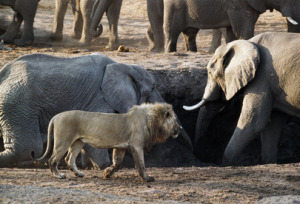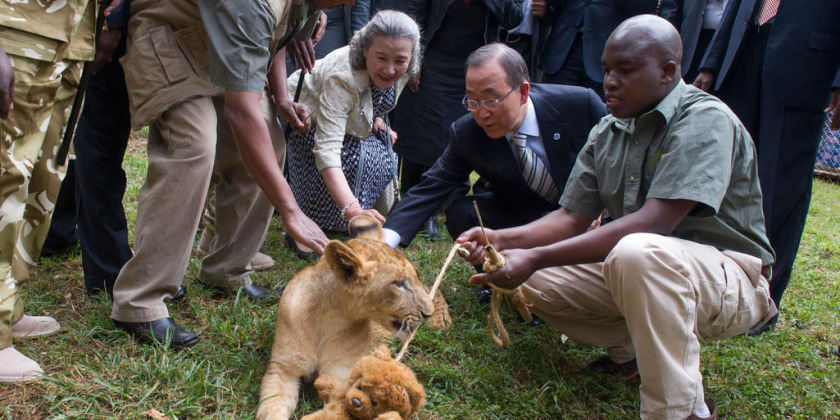If the United Kingdom has an Ambassador to the UN, why not the “Animal Kingdom”? Animal welfare, biodiversity, wildlife crimes, and the rapidly evolving view of “animal rights” are and properly deserve an international discussion. Wildlife poaching or the inhumane treatment of animals do affect the global community or in the least, perspectives that peoples have of each other as well as fellow animal creatures. However, is it time for someone to speak on behalf of animals?
Abuse & Exploitation only Bounded by Greed & Decadence:
Exploiting animals for food, labor, or even as our companions nonetheless requires from us a recognition beyond our mere needs. In parts of Asia they eat dogs and cats, but perhaps I have a cultural prejudice. In the Christian, Islamic, and Jewish cultures we kill cattle for consumption. At the Yulin Dog Meat Festival in China, killing is a celebration not borne out of hunger, necessity, or tradition – it started only in 1995 with China’s consumer society rise. The dogs are beaten and boiled alive for presumably the more flavorful and traditional consumption.
Of course, in the West we transport chicks in such inhumane conditions that they are in fact cooked alive even before slaughter. “Industrial farming” delivers horrors at a systematic scale with questionable human health and efficiency considerations. Elephants are killed in Africa solely for their tusks to be fashioned in Asia presumably as adornments for empty human lives. Whales continue to be hunted in the name of science and tradition, somehow neither rationalization worthy of the cost. The homes of the orangutan (forest person) are rapidly eradicated to cultivate cash crops, including cheap palm oil. We could continue with examples that make almost every country and peoples complicit in outright abuse/misuse. This is not about promoting a vegetarian or vegan style. Rather, the suffering inflicted is frequently unnecessary or borne out of convenient ignorance. In each situation there are also animal rights and/or welfare activists, the conscience and voice for those who cannot speak for themselves; and as in China, they represent the future of a society looking to a world defined by global communication and cooperation.
We cannot involve animals in the direct conversation but nonetheless can move forward the discussion among peoples. Within the United Nations roster of agencies and institutions, poaching and biodiversity are already identified as shared interest. The health/safety of animals in the food chain and the over-exploitation of our oceans are also on the agenda, at least in words if not always in deeds. There is a nascent discussion regarding the humane treatment of animals. Along with the various multilateral institutions, civil society has become engaged, but not necessarily with complementary agendas. (See: “Is Animal Rights the Next Human Rights?“)
There are civil society initiatives to put animal welfare and/or rights on the UN’s agenda. However, there is little agreement on what that means and no particular urgency among member states to move ahead with formal resolution. – (UN Security Council and General Assembly resolutions need member state sponsorship.)
Starting the Conversation about Animal Welfare/Rights even before Representation:
Special Representatives, Rapporteurs, and Experts are regularly appointed by UN Secretary General and other UN organs to review, inform, and advise on a broad range of issues, from human rights concerns, to outer space cooperation. (There is a post dubbed the “Alien Ambassador” but in actuality leading the UN Office for Outer Space Affairs.) The precedent of seeking input from both governments and civil society would serve a more comprehensive approach to animal welfare/rights alternatives. From political and economic considerations to religious and science leaders, we must be educated beyond old assumptions. Empathy and humanity are now being redefined as such relate to animals. There is no linear approach and International cooperation will ultimately be needed to bring into force any agreement that may be reached on paper.
Measures to Enhance Standing of Animals:
 At least at the outset, this does not mean that animals will have their own ambassador as a member state. Rather, the designated post or Special Representative would seek to represent human perspectives on animal welfare and/or rights. Nonetheless, several concrete steps could be undertaken more promptly even if the discussion might be indefinite to help mankind address evolving scientific and ethical considerations:
At least at the outset, this does not mean that animals will have their own ambassador as a member state. Rather, the designated post or Special Representative would seek to represent human perspectives on animal welfare and/or rights. Nonetheless, several concrete steps could be undertaken more promptly even if the discussion might be indefinite to help mankind address evolving scientific and ethical considerations:
—Define poaching and other crimes against wildlife including illicit trade as violations that could be prosecuted by the International Criminal Court (ICC) on complementary basis with national courts. Illicit wildlife frequently also includes grave violations of international humanitarian law, from child soldiers to systematic sexual abuse.
—Evaluate and propose new standards (perhaps to be adopted as international convention/treaty) defining humane treatment of domesticated animals as well as wildlife. (The CITES treaty body already undertakes similar responsibility for wildlife and fauna.)
—Develop review process, (similar to UN Human Rights Council evaluation for member states), that would assess the compliance of states with relevant standards consistent with whatever criteria have been adopted by international agreement. Here again, civil society can assume a more active role as it does in review of Member States’ human rights situation.
—Undertake effort to imprint a culture that respects animal life and environment beyond its possible human exploitation. There is no pleasure in killing another animal, and such promotion of empathy would also enhance respect for human rights.
Who will Stand for Animals before UN & International Courts?
The recent decision by the International Court of Justice against Japan’s whaling program reveals how the legal process may provide direction, and also, unfortunately, perhaps how states may still opt to selectively apply and/or ignore the “rule of law.” (Japan’s Government has announced its intention to circumvent the ICJ ruling.) That case before the ICJ was brought by Australia, and all cases before that international tribunal require a state to be initiator/plaintiff, as any resolution at the UNSC and UNGA also necessitates Member State sponsors. In the future though, this may be ripe for change. The UN has developed beyond the original creation as solely a club of states.
The UN and its various organs are already transitioning into representing the interests of the “global citizen” as well member states. It is a delicate process that arouses suspicions in member states such as China and mistrust among a segment of the American public. As a matter of animal welfare/rights, cruelty/abuse should have the same meaning for a dog in China as the US. Identifying animals by their nationality stretches sovereignty – people can be rabidly nationalistic but dogs cannot.
Should Animals be Able to Initiate Legal Proceedings & UN Resolutions?
Some legal systems are moving to facilitate animals as well as children – “minors” – to be independently represented in proceedings brought on their behalf. Why not accord similar status to animals before the ICC or ICJ or UN General Assembly, etc? If Japan decides to resume whaling, should a representative for whales be able to bring action or propose diplomatic/economic sanctions, without a state sponsor?
Even in the case of human rights, there is no standing before the ICJ; and in most organs of the UN, state action is needed for a formal resolution. Nonetheless, the UN Office of the High Commissioner for Human Rights has become ever more visible in at least highlighting concerns of grave violations of international humanitarian law. However, despite her vocal recent efforts to end impunity for war crimes in Syria, the former High Commissioner, Navi Pillay, has not overcome the parochial interests of the ‘big powers,” (particularly Moscow and Beijing which vetoed referral to the ICC.) Can we expect the Office of the High Commissioner for Human Rights under the recently elected Prince Zeid to evolve more in the direction of directly defending the rights of Global Citizens? Perhaps this overtime would also provide a model for those who would seek greater care for animals as also global citizens?
Are Animals “Global Citizens”?
Animals are not on this planet because we created them, at least not most. They belonged to Nature – God before us, and it will be our misdeed – sin if they, any species, disappear because of us. Many species precede humans, but it does not mean that they are or should be on equal status with humankind. Nonetheless, as species and individuals they deserve greater standing beyond the whims of corporations and persons to exploit or trivialize for sport or pleasure. (Besides harvesting and hunting animals, in some countries sexual abuse of animals is NOT outlawed.) Zoophilia and the Law
If for no other reason than to further respect among humans, we should encourage also a more inclusive global vision of animals. They may not be global citizens, but they do deserve standing and representation beyond narrow human whims and interests. Our shared earth, and all of us as humans, are made richer by their existence and empathy. Perhaps there will not be a UN Ambassador for Animals in our lifetime, but the conversation along with evolutionary thinking is already underway. Each one of us thus needs to be an Ambassador for those who cannot speak for themselves.
@MuhamedSacirbey
UN PHOTO/ Eskinder Debebe
Nairobi National Park: UNSG Ban Ki-moon adopts lion cub, Tumaini (Hope) to support efforts against wildlife trafficking
UN PHOTO/ E Darroch





Pingback: 天津夜网,天津桑拿,天津夜生活论坛-Powered by CleanPortfolio!()
Pingback: viagra usa()
Pingback: cheap cialis()
Pingback: cialis coupon walmart()
Pingback: How to get viagra()
Pingback: prices of cialis()
Pingback: cialis professional()
Pingback: cialis coupon()
Pingback: cheap viagra()
Pingback: generic ed pills()
Pingback: cheap erectile dysfunction pill()
Pingback: best over the counter ed pills()
Pingback: canada pharmacy()
Pingback: canadian online pharmacy()
Pingback: online canadian pharmacy()
Pingback: cialis visa()
Pingback: Viagra or cialis()
Pingback: vardenafil online pharmacy()
Pingback: levitra dosage()
Pingback: levitra pills()
Pingback: best casino online()
Pingback: slots online()
Pingback: generic sildenafil()
Pingback: real money casino games()
Pingback: casino online games()
Pingback: tadalafil 20mg()
Pingback: payday advance()
Pingback: cash advance online()
Pingback: short term loans()
Pingback: viagra pills()
Pingback: best real money online casinos()
Pingback: online casino real money usa()
Pingback: cialis 20()
Pingback: black jack online uk()
Pingback: web site slots online()
Pingback: free slots()
Pingback: cialis 5 mg()
Pingback: cialis generic()
Pingback: new cialis()
Pingback: 5 mg cialis()
Pingback: online casino games real money()
Pingback: jackpot party casino()
Pingback: casino online real money()
Pingback: casino slot()
Pingback: cheapest viagra()
Pingback: viagra sildenafil()
Pingback: generic sildenafil()
Pingback: buy tadalafil online()
Pingback: cialis buy cialis online()
Pingback: slot machines()
Pingback: casino games online()
Pingback: sildenafil citrate tablets 100 mg()
Pingback: Viagra 200mg over the counter()
Pingback: can you buy cialis without prescription()
Pingback: buy Viagra 150 mg()
Pingback: tadalafil()
Pingback: Cialis 10mg prices()
Pingback: generic viagra names()
Pingback: order viagra online()
Pingback: Cialis 60 mg cost()
Pingback: Cialis 10mg otc()
Pingback: buy Cialis 10 mg()
Pingback: sildenafil 120 mg no prescription()
Pingback: tadalafil 20mg price()
Pingback: levitra 60 mg coupon()
Pingback: lasix 100mg uk()
Pingback: cost of propecia 5mg()
Pingback: lexapro 10mg australia()
Pingback: viagra canada()
Pingback: finasteride 1 mg tablet()
Pingback: viagra()
Pingback: actos 15 mg without a prescription()
Pingback: aldactone 25 mg price()
Pingback: allegra 180 mg no prescription()
Pingback: allopurinol 300mg medication()
Pingback: where to buy amaryl 2mg()
Pingback: amoxicillin 250 mg without a prescription()
Pingback: ampicillin 250mg cost()
Pingback: cialistodo.com()
Pingback: antabuse 250 mg australia()
Pingback: arava 20mg coupon()
Pingback: strattera 40 mg otc()
Pingback: viagra high blood pressure()
Pingback: arimidex 1mg coupon()
Pingback: tamoxifen 10 mg usa()
Pingback: ashwagandha 60caps united kingdom()
Pingback: cialis bangkok()
Pingback: atarax 25 mg online pharmacy()
Pingback: augmentin 750/250 mg usa()
Pingback: avapro 300mg coupon()
Pingback: avodart 0,5mg otc()
Pingback: to buy viagra in calgary()
Pingback: baclofen 10 mg price()
Pingback: order bactrim 800/160mg()
Pingback: benicar 40 mg price()
Pingback: cialis uk next day delivery()
Pingback: how to purchase Biaxin 500 mg()
Pingback: order cialis from canada()
Pingback: cardizem 30mg medication()
Pingback: viagra generic online()
Pingback: cheapest casodex()
Pingback: catapres prices()
Pingback: ceclor 500 mg otc()
Pingback: ceftin otc()
Pingback: celebrex 100 mg usa()
Pingback: how to buy celexa()
Pingback: cephalexin 500mg pills()
Pingback: cost of cipro 750mg()
Pingback: claritin 10 mg united kingdom()
Pingback: real money casino()
Pingback: jackpot party casino()
Pingback: online gambling()
Pingback: casino slot()
Pingback: casino games()
Pingback: gambling games()
Pingback: real money casino games()
Pingback: real money casino()
Pingback: online casino usa real money()
Pingback: best casino online()
Pingback: car insurance florida()
Pingback: car insurance quotes rates()
Pingback: progressive insurance quote()
Pingback: buy discount viagra()
Pingback: california car insurance quotes()
Pingback: affordable insurance()
Pingback: car insurance quotes()
Pingback: infinity car insurance quotes company()
Pingback: car insurance online()
Pingback: esurance car insurance()
Pingback: amica car insurance quotes()
Pingback: same day personal loans()
Pingback: best payday loans()
Pingback: short term payday loans()
Pingback: installment loans near me()
Pingback: quick loans loan()
Pingback: bad credit loans near me no credit check()
Pingback: best payday loans for bad credit()
Pingback: personal loan definition()
Pingback: cbd hemp oil benefits amazon()
Pingback: best full spectrum cbd oil()
Pingback: cbd oil for pain reviews()
Pingback: cbd pills sale()
Pingback: viagra london drugs()
Pingback: cbd oil for pain relief()
Pingback: can you vape cbd oil()
Pingback: cbd oil entourage effect()
Pingback: cbd oil benefits and uses in books()
Pingback: Discount viagra without prescription()
Pingback: cbd oil for sale cheap()
Pingback: assignment define()
Pingback: free online paper writer()
Pingback: professional essay writer()
Pingback: mba essay writing service()
Pingback: hire essay writer()
Pingback: essay writing service australia()
Pingback: cheap essay writing service uk()
Pingback: the best essay writing services()
Pingback: buy essay online()
Pingback: mba essay writing service()
Pingback: cleocin purchase()
Pingback: clomid 25mg uk()
Pingback: clonidine 0,1 mg for sale()
Pingback: how to buy clozaril 100mg()
Pingback: Sale viagra()
Pingback: colchicine price()
Pingback: symbicort inhaler 160/4,5mcg for sale()
Pingback: cialis daily dose()
Pingback: cost of combivent 50/20 mcg()
Pingback: coreg 3,12mg online pharmacy()
Pingback: Canada viagra generic()
Pingback: compazine generic()
Pingback: coumadin 1 mg no prescription()
Pingback: cozaar 50mg medication()
Pingback: sale of viagra in singapore()
Pingback: crestor 20mg australia()
Pingback: cymbalta 20mg generic()
Pingback: dapsone caps pills()
Pingback: ddavp 0.1mg tablet()
Pingback: depakote pharmacy()
Pingback: diamox price()
Pingback: differin without a prescription()
Pingback: diltiazem 120 mg prices()
Pingback: Sample viagra()
Pingback: doxycycline without a prescription()
Pingback: dramamine purchase()
Pingback: elavil 50mg no prescription()
Pingback: erythromycin 500 mg price()
Pingback: etodolac 400 mg over the counter()
Pingback: cheapest flomax()
Pingback: flonase nasal spray 50 mcg no prescription()
Pingback: garcinia cambogia caps generic()
Pingback: how to purchase geodon()
Pingback: hyzaar cheap()
Pingback: imdur prices()
Pingback: imitrex pharmacy()
Pingback: imodium 2 mg purchase()
Pingback: read what he said()
Pingback: imuran purchase()
Pingback: indocin 25 mg pharmacy()
Pingback: lamisil 250mg united states()
Pingback: where to buy levaquin()
Pingback: lopid 300 mg otc()
Pingback: cheapest lopressor 100mg()
Pingback: luvox 50mg without prescription()
Pingback: macrobid australia()
Pingback: meclizine 25 mg cheap()
Pingback: buy viagra low cost()
Pingback: mestinon cost()
Pingback: micardis 20mg purchase()
Pingback: mobic tablets()
Pingback: cost of motrin 200mg()
Pingback: nortriptyline tablets()
Pingback: periactin price()
Pingback: viagra for sale london()
Pingback: phenergan 25 mg coupon()
Pingback: where to buy plaquenil 400mg()
Pingback: prednisolone pharmacy()
Pingback: cheap prevacid 30mg()
Pingback: prilosec 20 mg online()
Pingback: procardia 30mg medication()
Pingback: how to buy proscar()
Pingback: cheapest protonix 40mg()
Pingback: provigil coupon()
Pingback: pulmicort 100mcg tablet()
Pingback: pyridium 200 mg coupon()
Pingback: remeron 30 mg pharmacy()
Pingback: buy retin-a cream()
Pingback: revatio 20 mg online()
Pingback: risperdal australia()
Pingback: robaxin 500mg usa()
Pingback: rogaine 5% otc()
Pingback: cost of seroquel()
Pingback: singulair australia()
Pingback: skelaxin 400 mg prices()
Pingback: buy spiriva()
Pingback: tenormin 100 mg without prescription()
Pingback: thorazine 50 mg uk()
Pingback: toprol prices()
Pingback: tricor 200mg nz()
Pingback: valtrex 1000mg price()
Pingback: verapamil 40 mg united kingdom()
Pingback: voltaren without a doctor prescription()
Pingback: wellbutrin united states()
Pingback: zanaflex 4 mg no prescription()
Pingback: zestril 10mg coupon()
Pingback: buy cialis with echeck()
Pingback: cheap zithromax()
Pingback: find here()
Pingback: zocor 40 mg purchase()
Pingback: zovirax pills()
Pingback: cheapest zyprexa()
Pingback: viagra dosage()
Pingback: where to buy zyvox()
Pingback: sildenafil tablets()
Pingback: tadalafil 80mg no prescription()
Pingback: where to buy furosemide()
Pingback: order escitalopram()
Pingback: aripiprazole online()
Pingback: pioglitazone 15 mg without a doctor prescription()
Pingback: spironolactone 25mg generic()
Pingback: how to purchase fexofenadine()
Pingback: glimepiride canada()
Pingback: meclizine 25 mg cost()
Pingback: how to buy leflunomide 10mg()
Pingback: atomoxetine 40 mg tablet()
Pingback: donepezil 10 mg without a prescription()
Pingback: anastrozole 1mg cost()
Pingback: irbesartan 300 mg medication()
Pingback: dutasteride 0,5mg online()
Pingback: olmesartan 40 mg price()
Pingback: buspirone 5 mg cost()
Pingback: clonidine 0.1mg cheap()
Pingback: where can i buy cefuroxime 500mg()
Pingback: celecoxib tablets()
Pingback: citalopram without a prescription()
Pingback: cost of cephalexin 500 mg()
Pingback: where to buy ciprofloxacin()
Pingback: clindamycin 150 mg united states()
Pingback: clozapine price()
Pingback: do i need prescription to buy viagra()
Pingback: carvedilol 25 mg online pharmacy()
Pingback: warfarin 2 mg for sale()
Pingback: cheapest rosuvastatin()
Pingback: divalproex 125mg otc()
Pingback: trazodone uk()
Pingback: tolterodine 2 mg nz()
Pingback: how to purchase acetazolamide 250mg()
Pingback: fluconazole australia()
Pingback: phenytoin otc()
Pingback: oxybutynin united states()
Pingback: doxycycline 100mg medication()
Pingback: bisacodyl usa()
Pingback: venlafaxine 75mg without a prescription()
Pingback: buy viagra online with gift card()
Pingback: amitriptyline cost()
Pingback: permethrin pills()
Pingback: buy erythromycin 250 mg()
Pingback: difference between generic cialis and brand cialis()
Pingback: njptisdn()
Pingback: how to purchase estradiol 1 mg()
Pingback: where to buy tamsulosin 0.4mg()
Pingback: buy fluticasone mcg()
Pingback: alendronate 35mg pills()
Pingback: what is bph cialis()
Pingback: nitrofurantoin 100mg coupon()
Pingback: wat kost sildenafil bij apotheek()
Pingback: how much ivermectin for 12lb rabbit()
Pingback: order glipizide 5mg()
Pingback: cost of gnc viagra()
Pingback: isosorbide uk()
Pingback: sumatriptan pills()
Pingback: buy loperamide 2 mg()
Pingback: pastillas cialis 20 mg()
Pingback: where can i buy azathioprine()
Pingback: cheapest propranolol()
Pingback: indomethacin united kingdom()
Pingback: buy viagra india()
Pingback: how to purchase lamotrigine()
Pingback: terbinafine without a prescription()
Pingback: digoxinmg tablet()
Pingback: cheap levothyroxine mcg()
Pingback: medicine augmentin 875()
Pingback: furosemide cost australia()
Pingback: buy azithromycin with no prescription()
Pingback: ivermectin cost()
Pingback: how to buy albuterol tabs online without a prescription()
Pingback: gemfibrozil 300 mg pharmacy()
Pingback: metoprolol pharmacy()
Pingback: where to buy clotrimazole 10gclotrimazole united kingdom()
Pingback: doxycycline medscape()
Pingback: durezol vs prednisolone()
Pingback: clomid constipation()
Pingback: priligy seratonin()
Pingback: fish diflucan()
Pingback: order metoclopramide()
Pingback: synthroid not working()
Pingback: propecia for less()
Pingback: gabapentin neurontin high()
Pingback: is metformin bad()
Pingback: paxil vs prozac()
Pingback: plaquenil coronavirus()
Pingback: buy furosemide online usa()
Pingback: funny tinder lines()
Pingback: buy philippines()
Pingback: dapoxetine dose for erectile dysfunction()
Pingback: albuterol how often between doses()
Pingback: hydroxychloroquine sulfate nz()
Pingback: hydroxychloroquine walmart()
Pingback: hydroxychloroquine package insert()
Pingback: hydroxychloroquine substitute()
Pingback: ivermectil coupon()
Pingback: priligy dosage for premature ejaculation()
Pingback: stromectol made of()
Pingback: cost of deltasone without insurance()
Pingback: where can i buy ivermectin()
Pingback: canadian pharmacy cheap hydroxychloroquine()
Pingback: stromectol 6 for sale()
Pingback: ivermectin for kidney cancer()
Pingback: dosage ivermectin for humans()
Pingback: use of treat parasite infestations()
Pingback: buy amoxil usa()
Pingback: lasix 250 mg tablet()
Pingback: 1200 gabapentin()
Pingback: plaquenil 20 mg()
Pingback: prednisone for gout()
Pingback: buy priligy nz()
Pingback: provigil medicine()
Pingback: stromectol medication()
Pingback: ventolin pharmacy()
Pingback: what is zithromax()
Pingback: plaquenil uk price()
Pingback: prednisone 1 mg()
Pingback: viagra in canada over the counter()
Pingback: modafinil for sale()
Pingback: ventolin inhaler()
Pingback: zithromax 500mg tab()
Pingback: ps4 games with sex()
Pingback: real online casino()
Pingback: casino online stream()
Pingback: free online casino slot machines()
Pingback: free online casino no deposit()
Pingback: tropicana casino online()
Pingback: online casino with sign up bonus()
Pingback: top online casino reviews()
Pingback: online casino deutschland()
Pingback: keto recipes()
Pingback: keto food()
Pingback: keto buffalo chicken dip()
Pingback: keto diet foods()
Pingback: write an expository essay()
Pingback: mba essay writing services()
Pingback: write good essay()
Pingback: reflective essay on writing()
Pingback: writing college admission essays()
Pingback: gay indiana dating()
Pingback: gay black asian dating()
Pingback: dating gay teen()
Pingback: define critical thinking skills()
Pingback: critical thinking in schools()
Pingback: what are the 5 critical thinking skills?()
Pingback: synonyms for critical thinking()
Pingback: which is not necessary in a historical essay()
Pingback: how to start an essay introduction()
Pingback: mla format essay()
Pingback: essay format()
Pingback: cause and effect essay examples()
Pingback: racism essay()
Pingback: colege essay()
Pingback: essay proofreader()
Pingback: do my essay()
Pingback: meritking()
Pingback: elexusbet()
Pingback: madridnet()
Pingback: meritking()
Pingback: 3productions()
Pingback: meritroyalbet()
Pingback: eurocasino()
Pingback: how much is membership for gay dating sites()
Pingback: gay dating apps military man imposter()
Pingback: cruise gay dating()
Pingback: sado masocism dating gay site()
Pingback: gay sadistic men dating cite()
Pingback: gay dating site out personal custormer service()
Pingback: meritroyalbet()
Pingback: meritroyalbet()
Pingback: gay dating hookup()
Pingback: chat gay cam()
Pingback: utah gay bi chat()
Pingback: gay chubby dating()
Pingback: how much is ivermectin()
Pingback: stromectol pill for humans()
Pingback: levitra vs cialis()
Pingback: how much does viagra cost()
Pingback: ivermectin ken()
Pingback: ivermectin buy()
Pingback: buy albuterol online canada()
Pingback: i mask protocol()
Pingback: fortune slots free online()
Pingback: flccc website()
Pingback: aralen malaria()
Pingback: play ginger wild slots()
Pingback: highest paying slots()
Pingback: son and moon slots()
Pingback: buy tamoxifen()
Pingback: simslots free slots()
Pingback: buying clomid 25 mg()
Pingback: baricitinib moa()
Pingback: molnupiravir 400mg()
Pingback: ivermectin 1 topical cream()
Pingback: stromectol cream()
Pingback: ivermectin online()
Pingback: where can i buy oral ivermectin()
Pingback: ivermectin 2()
Pingback: ivermectin where to buy()
Pingback: where to get ivermectin()
Pingback: stromectol for sale()
Pingback: ivermectin ontario()
Pingback: where to buy ivermectin()
Pingback: slots winning video 2022()
Pingback: free online slots()
Pingback: wow equipment slots()
Pingback: cost of ivermectin()
Pingback: emils grayslake slots()
Pingback: meritking()
Pingback: ivermectin generic()
Pingback: meritroyalbet()
Pingback: order prednisone 40mg sale()
Pingback: viagra vs cialis()
Pingback: generic tadalafil online()
Pingback: walgreens provigil cost()
Pingback: cost of ivermectin 3mg tablets()
Pingback: viagra prices()
Pingback: stromectol 3 mg tablet()
Pingback: tadalafil sandoz()
Pingback: viagra for women()
Pingback: does merck make ivermectin()
Pingback: tadalafil cvs()
Pingback: cialis generic cialis()
Pingback: baymavi()
Pingback: baymavi()
Pingback: writing a rationale for a dissertation()
Pingback: buy sildenafil pills from canada()
Pingback: buy cialis reliable store()
Pingback: online dissertation help to write()
Pingback: dissertation citation chicago()
Pingback: what is cialis()
Pingback: masters dissertation writing services()
Pingback: masters dissertation writing()
Pingback: stromectol tablet 3 mg()
Pingback: buy sildenafil pills from canada()
Pingback: sildenafil tablets for sale()
Pingback: cialis online pharmacy()
Pingback: cialis prescription australia()
Pingback: tombala siteleri()
Pingback: purchase cialis for daily use()
Pingback: what is prednisone 20mg tablet for()
Pingback: buying prednisone online uk()
Pingback: molnupiravir pronunciation()
Pingback: generic tadalafil india()
Pingback: cialis prix()
Pingback: meritroyalbet()
Pingback: ivermectin 2ml()
Pingback: prednisone side effects in women()
Pingback: sildenafil pills()
Pingback: cialis pills()
Pingback: casino world play online()
Pingback: cialis online pharmacy()
Pingback: what is ivermectin()
Pingback: ivermectin powder()
Pingback: casino real money()
Pingback: cialis tablets()
Pingback: viagra sildenafil()
Pingback: cialis tablets()
Pingback: ivermectin generic()
Pingback: stromectol cvs()
Pingback: ivermectin 4 mg()
Pingback: ivermectin for sale()
Pingback: buy ivermectin 6 mg for humans()
Pingback: ivermectin us fda()
Pingback: ivermectin 12mg tabs()
Pingback: order ivermectin 12 mg()
Pingback: ivermectin 5 mg()
Pingback: ivermectin covid()
Pingback: ivermectin 6mg()
Pingback: stromectol uk buy()
Pingback: furosemide iv()
Pingback: buy generic lasix()
Pingback: ivermectin 2ml()
Pingback: generic ivermectin for humans()
Pingback: ivermectin horse paste for humans()
Pingback: stromectol drug()
Pingback: best liquid tadalafil()
Pingback: ivermectin 3 mg()
Pingback: madridbet giriş()
Pingback: luckyland casino()
Pingback: WordPress()
Pingback: buy stromectol()
Pingback: hydroxychloroquine prescription online()
Pingback: ivermectine arrow lab()
Pingback: what is ivermectin()
Pingback: walmart cialis daily()
Pingback: ivermectin 6()
Pingback: ivermectin topical()
Pingback: ivermectin 15 mg()
Pingback: tadalafil otc()
Pingback: ivermectin 0.1()
Pingback: Grandpashabet()
Pingback: meritking()
Pingback: meritking()
Pingback: izmir escort()
Pingback: grandpashabet()
Pingback: fuck porn()
Pingback: child porn()
Pingback: child porn()
Pingback: xxlargeseodigi()
Pingback: porn()
Pingback: child porn()
Pingback: porn()
Pingback: child porn()
Pingback: porn()
Pingback: bağcılar escort bayan()
Pingback: porn()
Pingback: How does excessive use of certain acne medications impact sexual health levitra dosage?()
Pingback: Are there any acupuncture treatments for erectile dysfunction order levitra?()
Pingback: pornn()
Pingback: How can I get free men's health cheapest levitra?()
Pingback: How are high-risk pregnancies managed to ensure the safety of both mother and baby levitra women?()
Pingback: porn()
Pingback: Remote Patient Monitoring - Health at Your Fingertips priligy 60 mg prezzo?()
Pingback: Medications and Fitness Optimization - Powering Workouts, Maximizing Results vidalista 40?()
Pingback: The Power of Telemedicine in Modern Healthcare stromectol 12mg online?()
Pingback: What keeps your prostate healthy buy Cenforce 100?()
Pingback: Is it worth it to play hard to get Cenforce 100mg for sale?()
Pingback: How does excessive cycling impact erectile function Cenforce 200 for sale?()
Pingback: What food is highest in magnesium Cenforce 200?()
Pingback: porn()
Pingback: Epidemiology and Contact Tracing in Disease Outbreaks hydroxychloroquine. where to buy?()
Pingback: What are the unique healthcare needs of the elderly population buy fildena 50mg?()
Pingback: Viral Hepatitis - Diagnosis, Treatment, and Prevention where to buy dapoxetine?()
Pingback: where is the best place to buy plaquenil?()
Pingback: what is priligy used for?()
Pingback: Medications and Sports Performance Recovery - Optimizing Muscular Repair ivermectin manufacturer?()
Pingback: Medications and Immune System Health - Strengthening Defenses, Guarding Wellness fildena 50mg usa?()
Pingback: Medications and Children's Health - Ensuring Safe Treatment 100 mg viagra 60 mg dapoxetine?()
Pingback: sex()
Pingback: What is the most common inhaler type what if i leave ventolin in my car on a hot days?()
Pingback: Can you have twins vaginally levitra discount coupons?()
Pingback: How long does it take for sperm to refill cheap generic viagra lowest prices?()
Pingback: Where can I find OTC options for leg swelling treatment ebay dapoxetine online()
Pingback: izmir travesti()
Pingback: What happens if you drink apple cider vinegar everyday ivermectin medicine()
Pingback: Are vacuum pumps good for ED tadalafil vidalista 20mg()
Pingback: where can i buy flagyl over the counter()
Pingback: vidalista()
Pingback: What is a prostate wash??()
Pingback: How do I spoil my man??()
Pingback: kadıköy escort()
Pingback: izmit escort()
Pingback: porno izleme sitesi()
Pingback: hd porno izle()
Pingback: dapoxetine - Can erectile dysfunction cured?()
Pingback: sildenafil with dapoxetine()
Pingback: istanbul travesti()
Pingback: porn()
Pingback: dapoxetine buy trusted source()
Pingback: albuterol hfa inhaler()
Pingback: kralbet()
Pingback: yasam ayavefe()
Pingback: kamagra()
Pingback: Azithromycin buy()
Pingback: where can i buy Azithromycin()
Pingback: ventolin smpc()
Pingback: amoxil capsule price()
Pingback: priligy 60 mg buy()
Pingback: vilitra pills()
Pingback: how to correctly use albuterol inhaler()
Pingback: Bu website sitemap ile güçlendirilmiştir()
Pingback: medicament stromectol 3 mg()
Pingback: vilitra 40()
Pingback: priligy price()
Pingback: grandpashabet()
Pingback: albuterol inhaler over the counter walgreens()
Pingback: grandpashabet()
Pingback: Can antibiotics prevent infection in patients undergoing chemotherapy hydroxychloroquine 200 mg?()
Pingback: child porn()
Pingback: buy priligy in the us()
Pingback: where can i buy azithromycin over the counter()
Pingback: buy dapoxetine usa()
Pingback: bu site sitemap tarafından güncellenmiştir()
Pingback: travesti.site()
Pingback: priligy uk()
Pingback: porn()
Pingback: fildena 50mg drug()
Pingback: kamagra sildenafil()
Pingback: child porn()
Pingback: flagyl 250 dosage()
Pingback: levitra bayer()
Pingback: vidalista 20 review()
Pingback: brand Cenforce 50mg()
Pingback: fildena 150mg extra power supply()
Pingback: buy ivermectin for humans()
Pingback: porn()
Pingback: clomiphene citrate 50 mg()
Pingback: clomid for men()
Pingback: clomid for low testosterone()
Pingback: Generic clomid no prescription()
Pingback: clomiphene citrate generic()
Pingback: porn()
Pingback: porn()
Pingback: porn()
Pingback: clomiphene()
Pingback: priligy pills()
Pingback: hangzhou kamagra()
Pingback: kralbet twitter()
Pingback: lugabet giriş()
Pingback: betgross giriş()
Pingback: vidalista 5mg()
Pingback: can women take vidalista()
Pingback: vidalista by centurion()
Pingback: advairdiskus()
Pingback: vidalista de 60 mg y edegra 100 mg y tetosterona()
Pingback: porn()
Pingback: cenforce 200 buy()
Pingback: oral Cenforce 100mg()
Pingback: child porn()
Pingback: jojobet()
Pingback: Cenforce 100 side effects()
Pingback: child porn()
Pingback: jojobet twitter()
Pingback: cost of 5mg cialis daily()
Pingback: fildena india()
Pingback: buy cenforce 200mg()
Pingback: fildena india()
Pingback: fildena 100()
Pingback: porn()
Pingback: meritking()
Pingback: anal porn()
Pingback: cenforce 100mg for sale()
Pingback: child porn()
Pingback: child porn()
Pingback: Cenforce 100 does it work()
Pingback: fildena usa()
Pingback: porn()
Pingback: Generic Sildenafil vs Viagra()
Pingback: cost Cenforce 100mg()
Pingback: cenforce kopen belgie()
Pingback: buy Cenforce 100mg online cheap()
Pingback: kamagra4less()
Pingback: spinco()
Pingback: kamagra online uk next day delivery()
Pingback: iyibilirdik()
Pingback: samsung taşınabilir ssd()
Pingback: buy proscar()
Pingback: is vidalista 10 generic cialis buy online()
Pingback: clomid 50mg buy online()
Pingback: vidalista 20mg()
Pingback: yabancı sim kart()
Pingback: clindamycin phosphate gel clincitop()
Pingback: kamagra oral jelly sildenafil()
Pingback: how does Sildenafil work()
Pingback: silagra 100mg()
Pingback: xenical over the counter()
Pingback: pro çilingir()
Pingback: denizli masaj salonu()
Pingback: kamagra tablets()
Pingback: stromectol tablets()
Pingback: ivermectol 12 tablet uses()